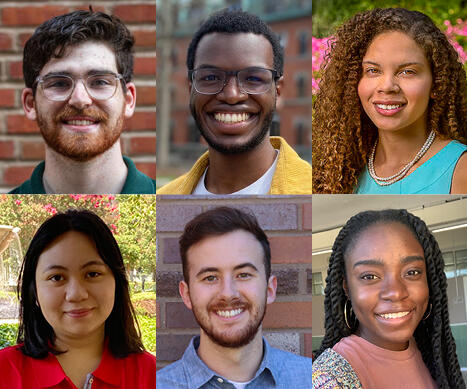
An overwhelming sense of gratitude is the common thread woven through each story of the six Yale Chemistry 2022 National Science Foundation (NSF) Fellows. As one of the country’s most-sought-after graduate research fellowships, few who apply receive the award, which provides students with a yearly $34,000 stipend for three years and one-time $12,000 educational allowance – what Daniel Chabeda, one of the winners, calls “an opportunity to step into freedom.”
The investment allows graduate students to pursue research that truly excites them rather than whatever a prospective PI is capable of funding. It means less time working to pay bills and more time researching to develop breakthroughs in science and engineering.
The potential for significant achievement, coupled with a passion for the promotion of STEM, is exactly why the NSF chose the six recipients from the Department of Chemistry: Noah Bartfield, a second-year Ph.D. student from the Herzon Lab, Daniel Chabeda, a fourth-year undergraduate student from the Batista Lab, Nia Harmon, a second-year Ph.D. student from the Wang Lab, Jenna Molas, a second-year Ph.D. student from the Ellman Lab, Tyler Myers, a second-year Ph.D. student from the Miller Group, and Natalie Williams, a second-year Ph.D. student from the Cha Research Group (Department of Engineering and Materials Science).
Competition was fierce. They were judged not only on their potential to better humanity through their science, but also on their efforts to better science by expanding its reach to those who otherwise would not have access. In their applications, they demonstrated their capacity to conduct groundbreaking research, a plan to perform novel research with the potential to bridge knowledge gaps and further science, and their commitment to breaking down barriers for those entering STEM fields.
Their award-winning research proposals will address some of the most urgent issues of our time, such as sustaining a hydrogen fuel economy, discovering and developing new medicines to treat cancers and other diseases, converting pollutants to useful products, harvesting energy for other purposes, and more.
“The application has a personal component as well,” said Harmon. “So, it’s not just ‘are you a good scientist? Are you able to carry out impactful work, work that has a lot of reach?’ What I think is interesting about the [fellowship] program is that it targets students who care about the future of science, giving back in terms of science, outreach, science communication, and making science more accessible.”
“It is an honor to receive [the award],” said Molas. “To me, it means a lot because I had spent a lot of time doing outreach, starting from high school to undergrad and continuing until now. Being recognized for that sustained outreach verifies how important that value is to the scientific community.”
They even mentioned what drives their passion for research. Chabeda said, “Faith has been a big part of my scientific journey. It’s like God has hidden mysteries in the universe, and we get the exhilarating experience of uncovering them.”
Not only did the students mention how grateful they are to have received the award and support from their lab mates and PIs, they also recognized the phenomenal applications of their peers, who they said were just as deserving of the award.
The following Chemistry student applicants received honorable mentions from the NSF: Rachel Cantrell, Mathew Chow, Jamie Cleron, Juan Serviano, Ume Tahir, and Linda Zuckerman.
Meet this year’s NSF Fellows:
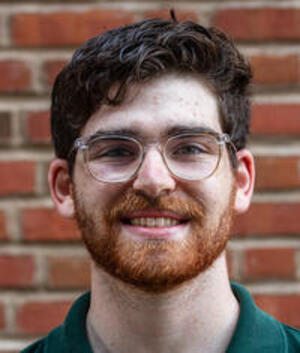 Noah Bartfield
Noah Bartfield
Second-year Ph.D. student
Advisor: Seth Herzon
Research: “I joined the Herzon group to investigate the interplay between complex organic structure and biological processes. In some cases, this requires traditional total synthesis of natural products and downstream biological evaluation, whereas other problems begin with recognizing challenging biological questions and require synthesis as a tool to uncover the answers. Our research employs both kinds of strategies, with the ultimate goal of using the emergent properties of complex molecules and natural products to improve society’s grasp on cell biology and complex medical conditions.”
Highlighted outreach: He has helped secure student travel grants through student council volunteerism, mentored students, served as a teaching assistant, and currently serves as a teaching fellow. Although the fellowship frees him of teaching obligations, he’s opted to pursue the teaching certificate program through Yale’s Poorvu Teaching Center to perfect the skills needed as a future professor.
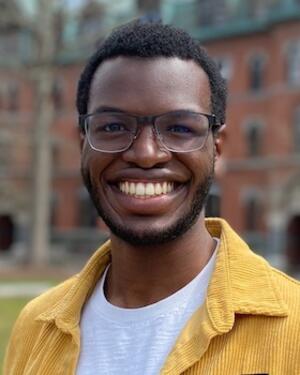 Daniel Chabeda
Daniel Chabeda
Fourth-year undergraduate
Pursuing a Ph.D. in chemistry at the University of California, Berkeley
Research: “I investigate chemical systems for renewable energy applications using computational techniques. My research probes the conversion of CO2 into clean fuel products at the molecular level using quantum mechanical methods, chemical insight, and a dose of scientific creativity. My goal is to elucidate principles in basic energy science that will enable a carbon-neutral fuel economy.”
Highlighted outreach: His position as a peer tutor in the Yale undergraduate course Chemistry of Food and Cooking involved research into factors influencing the inclusivity of underrepresented minorities in STEM education.
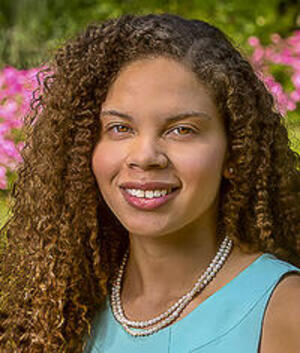 Nia Harmon
Nia Harmon
Second-year Ph.D. student
Advisor: Hailiang Wang
Research: “The focus of my research is to convert nitrate, a pollutant commonly found in groundwater, to ammonia, a useful product that can function as a fuel, fertilizer, or chemical feedstock. Our experimental approach involves using the electrochemical nitrate reduction reaction, which involves an input of water and (renewable) electricity to transform nitrate into ammonia. Clean water is a basic necessity for life; therefore, the goal of my research is to advance an environmentally friendly technology to remove nitrate contamination from groundwater and convert it to a useful product.”
Highlighted outreach: As president of the Florida State University chapter of the Florida Georgia Louis Stokes Alliance for Minority Participation, she helped underrepresented students get involved in STEM and organized faculty talks and networking events. She also led science demonstrations for middle and high school students. At Yale, she serves as a mentor to undergraduate students in the Yale Mentorship for Minority Students in STEM program. She is also a fellow in the Office for Graduate Student Development and Diversity.
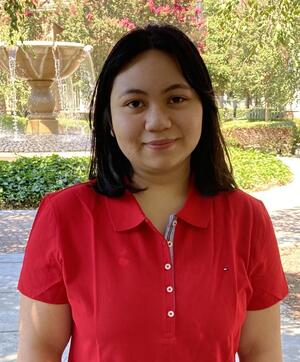 Jenna Cailin Molas
Jenna Cailin Molas
Second-year Ph.D. student
Advisor: Jonathan Ellman
Research: “My research is focused on developing efficient and modular methods to synthesize nitrogen heterocycles, which are commonly found in FDA-approved drugs and drug candidates. To accomplish this, we are investigating a novel reactivity for nitrogen functionalization to create these heterocycles in one step from readily accessible materials. Given the pharmaceutical relevance of their target structures, these methods can accelerate drug discovery by facilitating rapid analog creation for drug candidates.”
Highlighted outreach: At UCLA, she was the president of a student organization that provided individualized SAT tutoring to high school students who were the first in their family to attend college. When she’s not in the lab, she volunteers for Yale Open Labs’ Exploring Science, moderating presentation discussions with middle school students in New Haven.
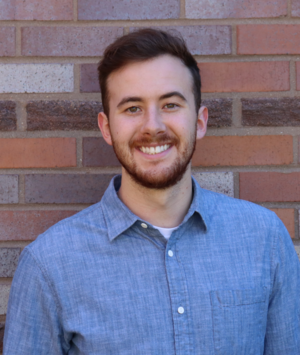 Tyler Myers
Tyler Myers
Second-year Ph.D. student
Advisor: Scott Miller
Research: “Amides are an important functional group in biologically relevant molecules, including antibiotics. Consequently, we are interested in finding new ways to incorporate this motif in a diverse array of substrates with a high degree of selectivity. We aim to achieve this by inserting nitrogen in carbon skeletons in a way that generates only one mirror image (enantiomer), allowing access to new potential therapeutics.”
Outreach: At the University of Wyoming, he delivered scientific demonstrations to K-12 students across Wyoming as a Learning Actively Mentoring Program Roadshow member. At Yale, he judges presentations for the New Haven Science Fair and the Yale Undergraduate Research Association.
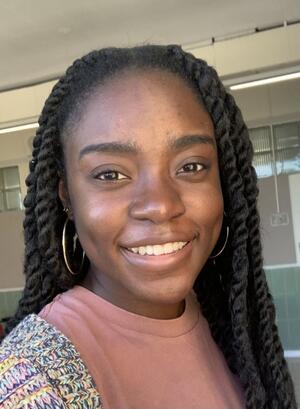 Natalie Williams
Natalie Williams
Second-year Ph.D. student, transferring to Cornell University
Advisor: Judy J. Cha (Department of Engineering and Materials Science)
Research: “My research studies tunable electronic and mechanical properties of two-dimensional (2D) materials. I will achieve this through surface functionalization using photo-excitable or magnetic organic molecules, which have demonstrated successful doping and molecular spin transfer in 2D materials. I believe it has a great potential to device applications in a wide array of fields such as energy storage and optoelectronics.”
Outreach: She is a founding member of the Yale chapter of the National Organization of Black Chemists and Chemical Engineering, a non-profit professional organization dedicated to assisting black and other minority students and professionals in fully realizing their potential in academic, professional, and entrepreneurial pursuits in chemistry, chemical engineering, and allied fields. She also mentors students as a member of Yale Mentorship for Minority Students in STEM.